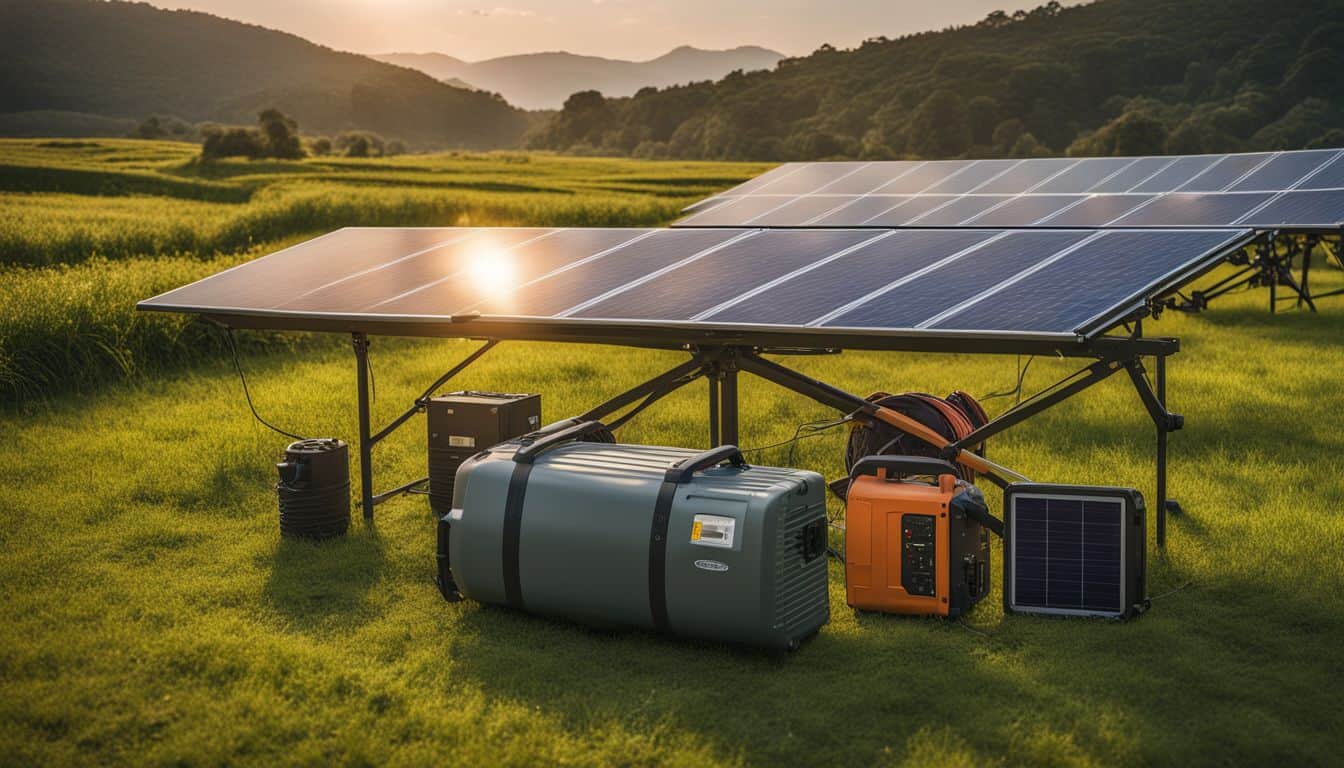The choice between solar generators and traditional fossil fuel-based generators has become a crucial consideration for individuals and businesses. As we grapple with the challenges of climate change and environmental degradation, understanding the environmental impact of these power sources is more important than ever.
Understanding Solar and Traditional Generators
Solar Generators
Solar generators harness the sun’s power through photovoltaic panels, converting sunlight into electrical energy. This clean energy is then stored in batteries for later use. Solar generators come in various sizes, from portable units perfect for camping to larger whole-home systems capable of powering entire households.
Traditional Generators
Traditional generators, on the other hand, rely on fossil fuels such as gasoline, diesel, or propane to generate electricity. These generators burn fuel to power an engine, which drives an alternator to produce electricity. While they offer reliable power on demand, their environmental impact is significantly different from that of solar generators.
Environmental Impact of Traditional Generators
Greenhouse Gas Emissions
One of the most significant environmental concerns with traditional generators is their contribution to greenhouse gas emissions. Burning fossil fuels releases carbon dioxide and other greenhouse gases into the atmosphere, exacerbating climate change. The impact of solar generators on reducing carbon footprints is substantial compared to their fossil fuel counterparts.
Air Pollution
Traditional generators also release various pollutants into the air, including nitrogen oxides, carbon monoxide, and particulate matter. These emissions can have severe health impacts on humans and ecosystems, contributing to respiratory issues and environmental degradation.
Noise Pollution
The operation of traditional generators is often accompanied by significant noise pollution. This can be particularly disruptive in residential or natural settings, affecting human comfort and wildlife.
Fuel Production and Transportation
The environmental cost of traditional generators extends beyond their operation. The extraction, refining, and transportation of fossil fuels used in these generators contribute to additional environmental impacts, including oil spills, habitat destruction, and further emissions.
Environmental Impact of Solar Generators
Clean Energy Production
Solar generators contribute to sustainability by producing clean energy with zero emissions during operation. This significant reduction in carbon footprint makes them an environmentally friendly alternative to traditional generators.
Minimal Noise Pollution
One of the most noticeable advantages of solar generators is their silent operation. This makes them ideal for use in noise-sensitive environments, preserving the tranquility of natural settings and residential areas.
Resource Conservation
These generators reduce reliance on finite fossil fuel resources by harnessing solar energy, contributing to long-term energy sustainability.
Manufacturing and Disposal Considerations
While solar generators have a clear advantage in operation, the environmental impact of producing solar panels and batteries must be considered. However, advancements in manufacturing processes and the increasing recyclability of components are continually reducing this impact.

Comparative Analysis
When comparing solar generators to traditional generators, several factors come into play:
- Carbon Footprint: Solar generators significantly outperform traditional generators in terms of carbon emissions over their lifetime.
- Air Quality Impact: Solar generators have a negligible impact on local air quality, unlike traditional generators, which can contribute to smog and other air quality issues.
- Noise Pollution: The silent operation of solar generators gives them a clear advantage in this area.
- Resource Efficiency: Traditional generators offer immediate power, but solar generators provide a more sustainable long-term energy solution.
Performance and Reliability
It’s worth noting that solar generators do have some limitations, particularly in terms of weather dependency. However, advancements in battery technology are continually improving their reliability. Traditional generators still hold an advantage in scenarios requiring continuous, high-power output regardless of weather conditions.
Economic Considerations
While solar generators often have a higher initial investment, their long-term cost-benefit analysis usually favors them due to minimal operational costs and free energy from the sun. Additionally, proper maintenance of solar generators can significantly extend their lifespan, further improving their economic value.
Future Trends and Innovations
Solar generators are poised to play an increasingly important role in the future of renewable energy. Advancements in solar technology continue to improve efficiency and storage capabilities, making solar generators an even more attractive option for environmentally conscious power generation.
Conclusion
While both solar and traditional generators have their place in the current energy landscape, solar generators offer significant environmental advantages. Their clean energy production, minimal noise pollution, and contribution to resource conservation make them a superior choice for those prioritizing environmental impact in their power solutions.
The gap in performance and reliability between solar and traditional generators is likely to narrow further as technology advances, solidifying solar generators as a critical component in our transition to a more sustainable energy future.











Leave a Reply